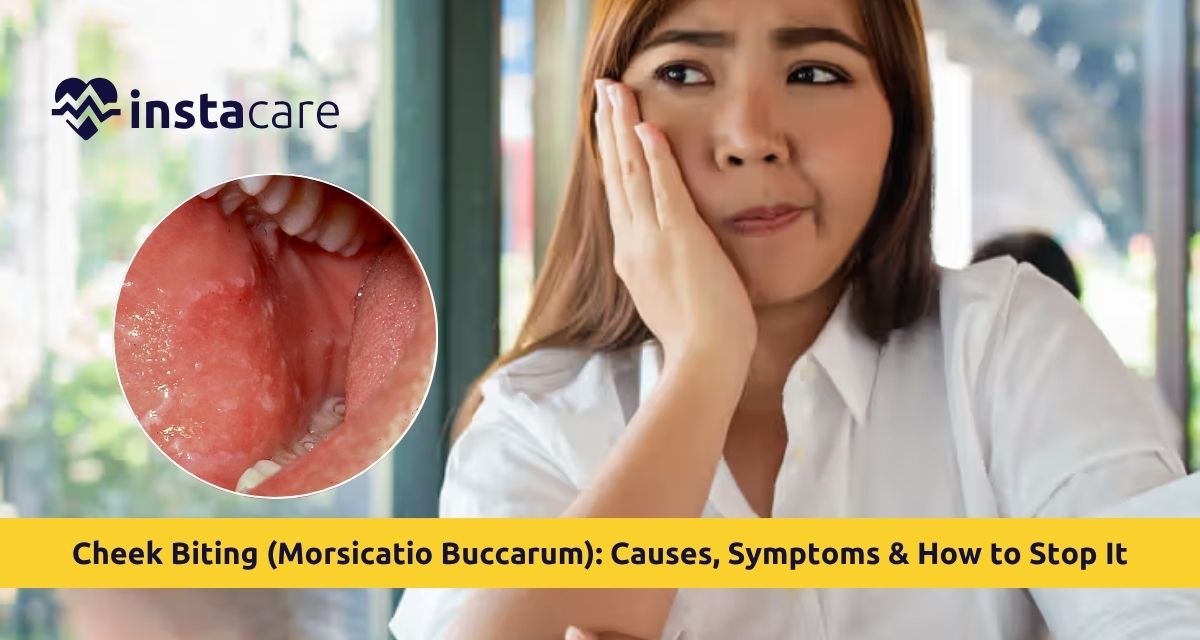Do you find yourself biting the inside cheek, perhaps when you are stressed or have it as a habit? Such a harmless action is referred to as cheek biting or more technically as Morsicatio Buccarum. It develops in the majority of people at some point, but in others, it becomes a repeated and painful condition.
Cheek biting can cause excruciating ulceration, mucosal injury, and repeated oral issues. You need to be aware of whether your cheek biting is a habit or an innate behavior problem because the Morsicatio buccarum treatment depends on the reason. In this article, we have addressed everything you might want to know regarding it, including Causes of cheek biting, symptoms, and most significantly, how to quit cheek biting forever.
What is Cheek Biting (Morsicatio Buccarum)?
Morsicatio Buccarum is a condition in which the individual bites or chews the lining of the cheek habitually or subconsciously and/or by habit. It is also a trauma of the oral mucosa and has the potential of developing whistling patches, thickened skin, and painful ulcers in the long run.
It is commonly found to have two Types of cheek biting:
- Accidental Cheek Biting: Most frequently a result of uneven teeth or eating and talking too rapidly.
- Chronic Cheek Biting: Chronic cheek biting is a habit or involuntary act usually associated with psychological illness such as stress, anxiety, or obsessive-compulsive behavior.
In chronic cheek biting, the condition is usually categorized as body-focused repetitive behaviors (BFRBs), where one keeps injuring his or her body subconsciously. These Repetitive biting of cheek acts have physical and emotional consequences.
Various Reasons for Cheek Biting
We need to examine the reasons behind cheek biting in order to correct it properly. The following are some of the common causes:
Malocclusion or Dental Misalignment
Improper or insufficient alignment of the teeth, also known as malocclusion, can cause involuntary cheek biting during eating, talking, or even sleeping.
Psychological Stress
Psychological causes of cheek biting is stress. Emotional tension is a common repeated reason for cheek biting. People bite the inner cheek when tense, nervous, or anxious. This would be an oral stress habit.
Habitual Behavior
People make cheek biting a habitual ingrained habit pattern. Cheek chewing is a habit that is not realized until pain or evidence of damage is noticed.
Obsessive-Compulsive and Anxiety Disorders
Cheek biting also shares correlations with psychological illnesses like Obsessive-Compulsive Disorder (OCD) and Body Dysmorphic Disorder (BDD). The subjects of these illnesses bite their cheeks to alleviate the pressure from inside.
Oral Injuries or Irritations
An earlier inner cheek injury, say due to hard food or dental devices, might result in uneven surfaces of the mouth. These are liable to usual chewing.
Dental Appliances
Poor-fitting dentures, retainers, or braces can erode the inside of the mouth and cause biting.
Symptoms of Most Frequent Cheek Biting
Increased cheek biting over time will produce obvious and often painful symptoms. One of the initial symptoms is the development of white, grey, or rough patches on the inner cheeks due to repeated erosion. The patches might be leathery or thickened.
Pain and tenderness are also felt, typically while speaking or chewing. The mucous membrane covering the inner cheek becomes sensitive and inflamed to a point of unconscious biting. Chronic trauma results in ulcers or eroding sores that will sting from the use of spicy or acidic foods. Even worse, tissue damage or bleeding may occur.
With the passage of time, frequent trauma can result in thickening or scarring of mucosa, a defense mechanism of the body and changing the texture of the cheek lining. Without treatment, this oral mucosa trauma will result in infection or change of tissue in the long term.
How to Prevent Check Biting?
To control chronic cheek biting, a blend of behavior modalities, mouth care, and professional assistance in certain situations is required. Six helpful ways of giving up the habit are discussed below:
Behavioral Therapy
Behavioral therapy for cheek biting, Cognitive Behavior Therapy (CBT), assists in identifying the psychological stimuli that cause cheek biting. CBT is instructed to incorporate coping styles that are healthier, such as substituting cheek biting with a safe behavior. CBT works particularly well for anxious, OCD, or other psychologically based reasons.
Wear a Mouth Guard
Night Mouth guard for cheek biting use prevents cheek tissue contact by teeth. Dentists commonly recommend this appliance for patients with chronic cheek biting and bruxism (teeth grinding). Custom-fitting guards are more comfortable and protective than off-the-shelf guards.
Address Emotional Triggers
Emotional management can help decrease stress-related oral habits. Some of the stress-reducing techniques are useful:
Relaxation of emotional tension prevents unconscious oral habits such as Cheek chewing habit.
Correct Dental Problems
If the problem is malocclusion, see an orthodontist or a dentist. Correcting your bite with veneers, retainers, or braces stops accidental cheek biting. How to stop cheek biting also includes correcting structural problems also stops oral mucosa trauma.
Enhance Awareness of Self
Awareness of self is where the change of unconscious habit begins. Try the following:
- Track habits in a journal
- Place reminder apps or sticky notes on the job
- Have someone remind you if you catch yourself biting
- Use a bitter-tasting gel or spray in the cheek (over-the-counter)
These habits disrupt the habit and take back control.
Utilize Alternatives to Cheewing
Fill the mouth with something other than biting cheeks. Instead of cheek biting, chew on:
- Sugarless gum
- Chewable jewellery
- Crunchy healthy snacks such as carrots or celery
These alternatives stimulate your jaw and may satisfy your physical urge to chew safely.
Conclusion
Cheek biting may not appear much, but compulsive or habitual cheek biting is risky for both your mental and oral health. From internal cheek trauma to irreversible oral damage, the consequences of Morsicatio Buccarum are very real. The good news? With the right approach, be it behavioral therapy, a mouth guard, or managing underlying stress, you can overcome the habit. If you’ve been struggling with this issue, consult a healthcare provider or mental health professional for a personalized plan.
Please book an appointment with the
best Dentist in Lahore, Karachi, Islamabad, and all major cities of Pakistan through
InstaCare, or call our helpline at 03171777509 to find a verified doctor for your disease.












